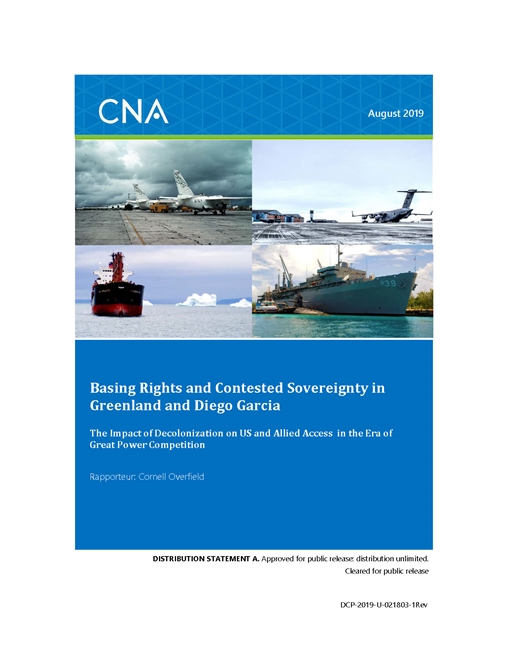On August 21, 2019, CNA’s Strategy and Policy Analysis program hosted an on-the-record event to discuss how recent developments in sovereignty politics could affect US military basing rights around the world, particularly in Greenland and Diego Garcia. Both are currently part of US allies’ territories—the former as a constituent within the Kingdom of Denmark and the latter as the largest island in the British Indian Ocean Territory—but the status of either one (or both) could change, if Mauritius successfully pressures the UK to cede Diego Garcia, or if Greenland acquires its independence. The event featured CNA senior vice president Mr. Mark Rosen, CNA analyst Dr. Steven Wills, and Ms. Rachel Ellehuus, deputy director of the Center for Strategic and International Studies’ Europe program. Ms. Nilanthi Samaranayake, director of CNA’s Strategy and Policy Analysis program, moderated the conversation. Panelists appraised recent developments with Greenland and Diego Garcia in their historical perspective, as well as the strategic and operational advantages of US access to the two locations. Discussants noted that the bases are key enablers of US military missions, from force projection to submarine tracking, yet agreed that the US approach to basing could benefit from both a greater appreciation of long-term strategic needs and a more concerted effort to make US bases acceptable to local populations and their governments.
Key Points of the Discussion
- Naval Support Facility Diego Garcia and Thule Air Base remain immensely valuable to the US military as it seeks to execute its missions in a new era of great power competition. The missions tasked to Diego Garcia and Thule Air Base may have changed since they were established in the Cold War, but they remain vital as the US projects force overseas, monitors other great powers, and minimizes risks to deterrence.
- The choices that the US and its allies make in both regions could set dangerous precedents for adversaries to exploit in their own sovereignty-related causes. Appearing to downplay the International Court of Justice’s (ICJ’s) recent advisory opinion on Diego Garcia risks undercutting US efforts to encourage the rule of law, especially in the South China Sea.
- Engaging in dialogue directly with local populations and leaders can pay dividends. The United States should engage with populations who claim sovereignty over territories such as Greenland and the Chagos Islands in search of a modus vivendi that continues US military access while recognizing that others have ultimate authority over the land on which US bases are built. Doing so may be difficult, but it will both make US bases more secure politically and bring US actions in line with rhetoric on the value of the rule of law.
- Economic benefits are essential means of making US bases welcome in other countries. As illustrated by recent controversy between President Trump and the Danish government, officials have been reminded of the strategic importance of Greenland and the risk posed by underinvestment. Yet, proposals to buy the territory risk spending the money in the wrong place. Instead of trying to buy sovereignty, the US could significantly improve the bases’ political viability if it ensured that local populations displaced or affected by the base had clear economic stakes in its existence.
Details
- Pages:
- Document Number:
- Publication Date: 8/27/2019
